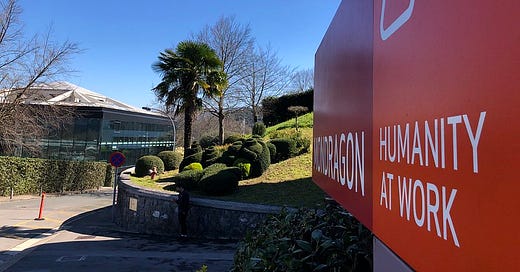The story of Mondragon, the world’s largest worker cooperative, is inspiring in and of itself. In 1956, a blind Catholic priest, José María Arizmendiarrieta, and a half-dozen unemployed steelworkers in the Basque region of Spain organized a bank, a school, and other industries that revived an economically distressed area. As of 2023, Mondragon could boast 92 autonomous companies that collectively employ 70,500 workers and earn annual profits of €593 million. Less appreciated is the fact that Mondragon began when Spain was ruled by Francisco Franco, a brutal fascist dictator. The cooperatives were a powerful grassroots response to Franco. If democracy disappears nationally, it can still find expression in business.
I’m unafraid to say the obvious: President Donald Trump is the Generalissimo Franco of our time. He’s a wannabe dictator infatuated with all the elements of fascism: top-down assertions of power, a hostility to legal norms and democratic processes, repression of dissent, support for armed right-wing militias, a bloodlust for conflict, a cult of personality, an alliance with oligarchs—I could go on. The degree to which Trump damages our country depends on as yet unwritten history, including the courage of moderate Republicans, restraints imposed by federal courts, and the next congressional election.
But the real resistance lies within us. We still have the ability to create democratically run businesses where diversity, free thinking, and liberal values can thrive. Our first article, apropos to this theme, is a summary of an important new book on “Solidarity Cities.” Recent U.S. research reveals a striking pattern:
“The very neighborhoods redlined into disinvestment and organized abandonment decades ago have become hubs of worker cooperatives, credit unions, community gardens and mutual aid networks that, together, constitute the decentralized but vibrant solidarity economy movement.”
This solidarity movement is alive, well, and growing in the United States, and it’s precisely where we should invest our time, energy, and money to keep the embers of democracy from going cold.
Our paying subscribers will also find other interesting news, including:
How Lafayette Square Institute’s data is being used to promote local investment in affordable housing and conversions of companies into employee-owned entities.
How authors are using crowdfunding to perform end-runs around an increasingly dysfunctional publishing industry.
And how Australia is seeing new records broken in its own crowdfunding industry.
Finally, I want to renew my call for a free B-Corp assessment performed by my business students at Bard. If your company is interested in undergoing an evaluation of its social performance, please contact Jen. It honestly doesn’t matter whether you decide to become a B-Corp. Most companies we work with are just looking to benchmark their internal social performance.
If you’re not yet a paying subscriber and you like the work we do supporting democracy on Main Street, please click the button below.
Michael Shuman, Publisher
A Paid Subscription Gets You:
✔️ News Links
✔️ In-Depth Interviews
✔️ Latest Listings of Local Investment Opportunities
✔️ Monthly Virtual Meetings With Michael Shuman
✔️ Notable New Resources
✔️ Partner News & Voices
✔️ Job Listings
SPONSOR CORNER
The National Coalition for Community Capital (NC3) is dedicated to educating, advocating, and activating community capital—and serves as MSJ’s fiscal sponsor. Thank you for being a part of a growing movement! Contact NC3 for support integrating local investing in your work: info@nc3now.org.
NC3 UPDATES AND ANNOUNCEMENTS
We are pleased to share that the “Changing the Paradigm: Mobilizing Community Investment Funds” event was a resounding success! Held on March 7, 2025, in the city of East Lansing, MI, we welcomed a total of 116 attendees from 17 states and Canada. This event not only met our goals of engagement and networking but also proved to be profitable and impactful information-sharing for everyone involved.
One of the highlights was that we brought together 17 speakers, notably Daniel Gilmartin, the Executive Director & CEO of the Michigan Municipal League, whose keynote address emphasized the future of community capital and ignited meaningful discussions among attendees. Our morning breakout sessions, led by Kathleen Minogue, Jessica David, Brian Beckon, and Kate Redman earned high praise from the vast majority of participants. And our afternoon Mobilize workshops offered “a wealth of information,” according to one participant.
Thank you to everyone who participated and contributed to making this event a valuable milestone in our ongoing journey toward community investment. We look forward to seeing everyone at future events!
Keep reading with a 7-day free trial
Subscribe to The Main Street Journal to keep reading this post and get 7 days of free access to the full post archives.




